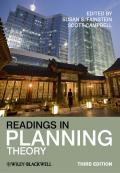
The third edition of Readings in Planning Theory features thirteen new readings that define current debates and presents the works that constitute the mainfocus of the field, addressing the central issues that face planners as theorists and practitioners. Expands the focus on international planning by including globalization and theories of development Includes new readings that examine themes emerging in planning theory, including a critique of the modernist roots of centralized planning, a re-emphasis on space in planning, and a discussion of the difficulty of sustainable development Features new case studies of planning success and failure on both sides of the Atlantic Addresses the rangeof core planning theory so as to remain the primary text in urban planning courses Examines the current state of planning theory and the new directions it has taken in recent years Draws on a wide range of authors who address planning history, arguments for and against planning, competing planning styles, planning ethics, the public interest, and considerations of race and gender INDICE: Introduction: The Structure and Debates of Planning Theory. I. Foundations of 20th Century Planning Theory. Section Introduction. 1. Robert Fishman, Urban Utopias: Ebenezer Howard, Frank Lloyd Wright and Le Corbusier. 2. Jane Jacobs, The Death and Life of Great American Cities. 3. John Friedmann, The Good City: In Defense of Utopian Thinking. II. Planning: Justifications and Critiques. Section Introduction. 4. Heather Campbell and Robert Marshall, Utilitarianism's Bad Breath? A Re-evalution of the Public Interest Justification for Planning. 5. Richard E. Foglesong, Planning the Capitalist City. 6. Leonie Sandercock, Mongrel Cities. 7. James C. Scott, Seeing Like a State: How Certain Schemes to Improve the Human Condition Have Failed. 8. Tim Love, Urban design after Battery Park City. III. Planning Types/Normative frameworks. Section Introduction. 9. Susan S. Fainstein, Planning Theory and the City. 10. Charles E. Lindblom, The Science of Muddling Through. 11. Paul Davidoff, Advocacy and Pluralism in Planning. 12. John Forester, Challenges of Deliberation and Participation. 13. Patsy Healey, Traditions of Planning Thought. IV. Planning in Action: Successes, Failures, and Strategies. Section Introduction. 14. Matti Siemiatycki, Implications of Private-Public Partnerships on the Development of Urban Public Transit Infrastructure: The Case of Vancouver, Canada. 15. James deFilippis, Collective Ownership and Community Control and Development: The LongView. 16. Vivien Lowndes, Citizenship and Urban Politics. 17. Bent Flyvbjerg,Bringing Power to Planning Research: One Researcher's Praxis Story. V. Race, Gender and City Planning. Section Introduction. 18. Iris Marion Young, Inclusion and Democracy. 19. June Manning Thomas, The Minority-race Planner in the Quest for a Just City. 20. Dolores Hayden, Nurturing: Home, Mom and Apple Pie. 21. Michael Frisch, Planning as a Heterosexist Project. VI. Conflicting Priorities. Section Introduction. 22. Scott Campbell, Green Cities, Growing Cities, Just Cities? Urban Planning and the Contradictions of Sustainable Development. 23. American Institute of Certified Planners, Code of Ethics and Professional Conduct. 24. Frank Fischer, Public Policy as Discursive Construct: Social Meaning and Multiple Realities. 25. Nicholas Low and Brendan Gleeson, Environmental Justice. 26. Margaret Kohn, The Mauling of Public Space. VII Planning in a Globalized World. Section Introduction. 27. Ward Steven, Reexamining the International Diffusion of Planning. 28. Peter Evans, Political Strategies for More Livable Cities. 29. Yang Zheng and Ke Fang, Is history repeating itself? UrbanRenewal in the United States to Inner-City Redevelopment in China. 30. Oren Yiftachel, Re-engaging Planning Theory? Towards 'South-Eastern' Perspectives.
- ISBN: 978-1-4443-3080-9
- Editorial: Wiley-Blackwell
- Encuadernacion: Rústica
- Páginas: 560
- Fecha Publicación: 26/08/2011
- Nº Volúmenes: 1
- Idioma: Inglés
